Entrepreneurship and Small Business Management: UK Ventures Analysis
VerifiedAdded on 2023/01/19
|15
|3965
|53
Report
AI Summary
This report provides a comprehensive analysis of entrepreneurship and small business management, focusing on the UK context. It identifies various entrepreneurial ventures, including small, scalable, large, and social ventures, and explores their relationship to different typologies of entrepreneurship such as managed growth and lifestyle approaches. The report assesses the impact of micro and small businesses on the UK economy using statistical data, highlighting their role in employment generation and infrastructure development. It also explains the importance of small businesses and start-ups in fostering the growth of the social economy. Furthermore, the report delves into the characteristics, traits, and skills of successful entrepreneurs, differentiating them from typical business managers, and examines the influence of background and experience on entrepreneurial success. The report concludes by emphasizing the critical role of entrepreneurship in driving economic and social development.

Entrepreneurship and Small
Business Management
Business Management
Paraphrase This Document
Need a fresh take? Get an instant paraphrase of this document with our AI Paraphraser
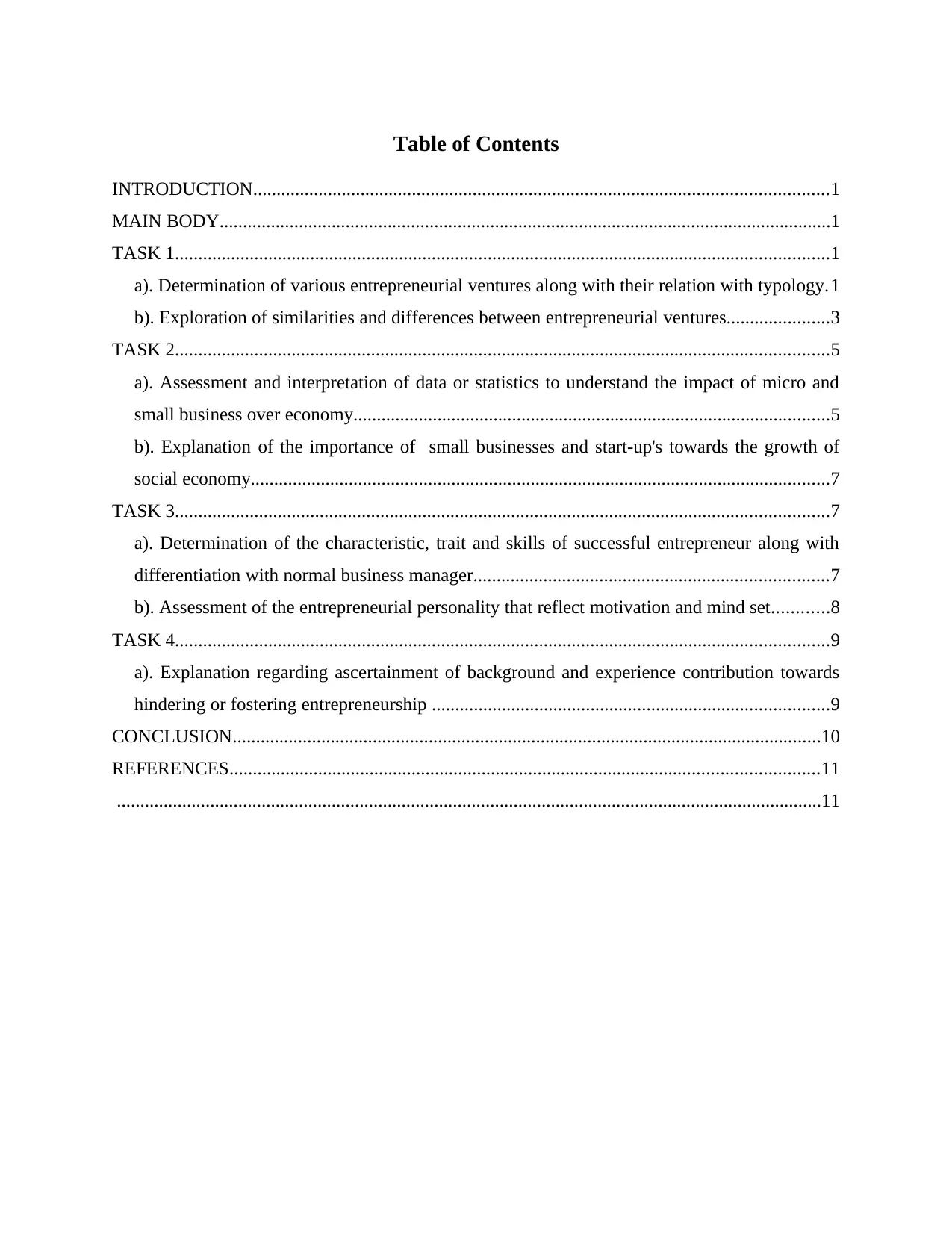
Table of Contents
INTRODUCTION...........................................................................................................................1
MAIN BODY...................................................................................................................................1
TASK 1............................................................................................................................................1
a). Determination of various entrepreneurial ventures along with their relation with typology.1
b). Exploration of similarities and differences between entrepreneurial ventures......................3
TASK 2............................................................................................................................................5
a). Assessment and interpretation of data or statistics to understand the impact of micro and
small business over economy......................................................................................................5
b). Explanation of the importance of small businesses and start-up's towards the growth of
social economy............................................................................................................................7
TASK 3............................................................................................................................................7
a). Determination of the characteristic, trait and skills of successful entrepreneur along with
differentiation with normal business manager............................................................................7
b). Assessment of the entrepreneurial personality that reflect motivation and mind set............8
TASK 4............................................................................................................................................9
a). Explanation regarding ascertainment of background and experience contribution towards
hindering or fostering entrepreneurship .....................................................................................9
CONCLUSION..............................................................................................................................10
REFERENCES..............................................................................................................................11
.......................................................................................................................................................11
INTRODUCTION...........................................................................................................................1
MAIN BODY...................................................................................................................................1
TASK 1............................................................................................................................................1
a). Determination of various entrepreneurial ventures along with their relation with typology.1
b). Exploration of similarities and differences between entrepreneurial ventures......................3
TASK 2............................................................................................................................................5
a). Assessment and interpretation of data or statistics to understand the impact of micro and
small business over economy......................................................................................................5
b). Explanation of the importance of small businesses and start-up's towards the growth of
social economy............................................................................................................................7
TASK 3............................................................................................................................................7
a). Determination of the characteristic, trait and skills of successful entrepreneur along with
differentiation with normal business manager............................................................................7
b). Assessment of the entrepreneurial personality that reflect motivation and mind set............8
TASK 4............................................................................................................................................9
a). Explanation regarding ascertainment of background and experience contribution towards
hindering or fostering entrepreneurship .....................................................................................9
CONCLUSION..............................................................................................................................10
REFERENCES..............................................................................................................................11
.......................................................................................................................................................11

⊘ This is a preview!⊘
Do you want full access?
Subscribe today to unlock all pages.

Trusted by 1+ million students worldwide
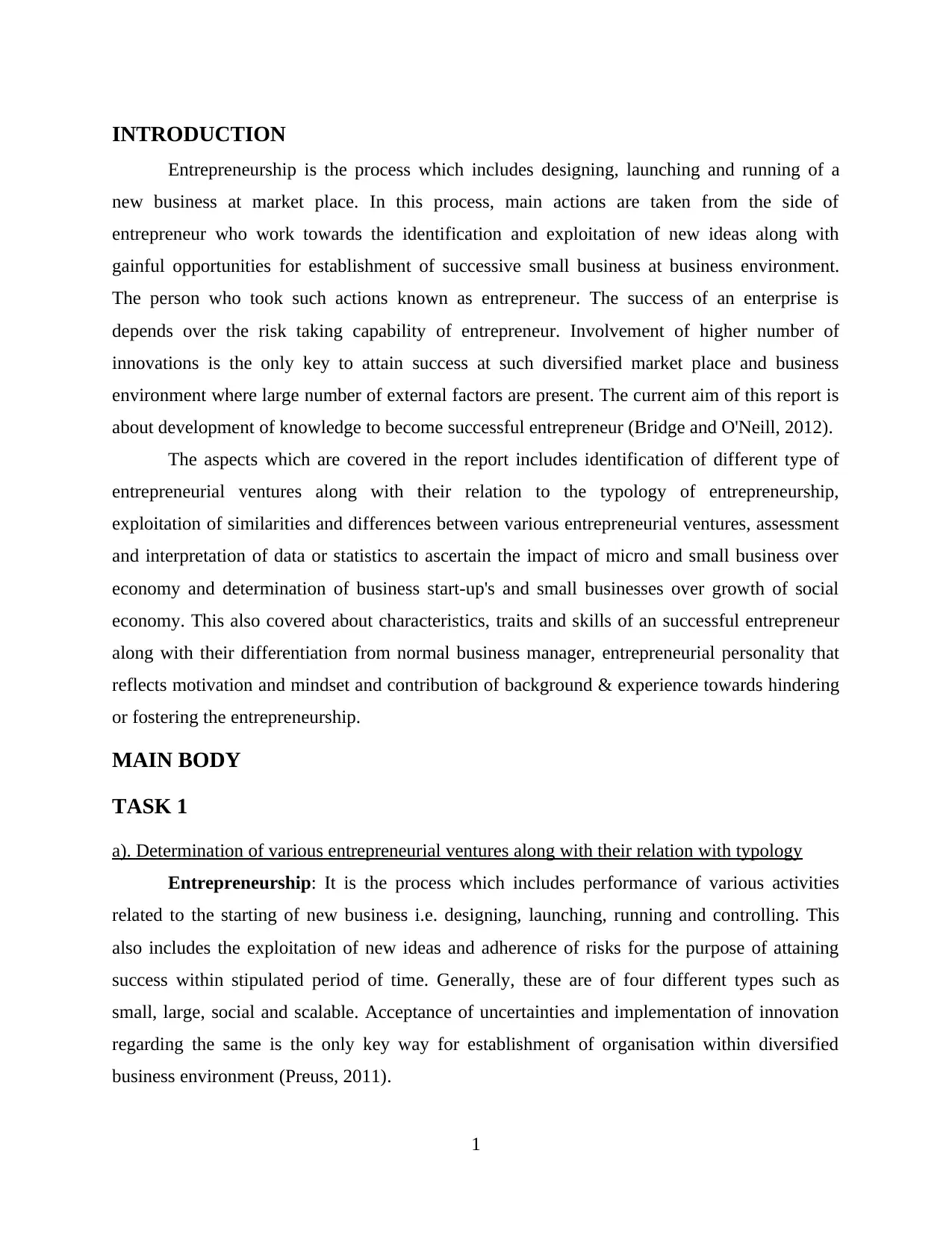
INTRODUCTION
Entrepreneurship is the process which includes designing, launching and running of a
new business at market place. In this process, main actions are taken from the side of
entrepreneur who work towards the identification and exploitation of new ideas along with
gainful opportunities for establishment of successive small business at business environment.
The person who took such actions known as entrepreneur. The success of an enterprise is
depends over the risk taking capability of entrepreneur. Involvement of higher number of
innovations is the only key to attain success at such diversified market place and business
environment where large number of external factors are present. The current aim of this report is
about development of knowledge to become successful entrepreneur (Bridge and O'Neill, 2012).
The aspects which are covered in the report includes identification of different type of
entrepreneurial ventures along with their relation to the typology of entrepreneurship,
exploitation of similarities and differences between various entrepreneurial ventures, assessment
and interpretation of data or statistics to ascertain the impact of micro and small business over
economy and determination of business start-up's and small businesses over growth of social
economy. This also covered about characteristics, traits and skills of an successful entrepreneur
along with their differentiation from normal business manager, entrepreneurial personality that
reflects motivation and mindset and contribution of background & experience towards hindering
or fostering the entrepreneurship.
MAIN BODY
TASK 1
a). Determination of various entrepreneurial ventures along with their relation with typology
Entrepreneurship: It is the process which includes performance of various activities
related to the starting of new business i.e. designing, launching, running and controlling. This
also includes the exploitation of new ideas and adherence of risks for the purpose of attaining
success within stipulated period of time. Generally, these are of four different types such as
small, large, social and scalable. Acceptance of uncertainties and implementation of innovation
regarding the same is the only key way for establishment of organisation within diversified
business environment (Preuss, 2011).
1
Entrepreneurship is the process which includes designing, launching and running of a
new business at market place. In this process, main actions are taken from the side of
entrepreneur who work towards the identification and exploitation of new ideas along with
gainful opportunities for establishment of successive small business at business environment.
The person who took such actions known as entrepreneur. The success of an enterprise is
depends over the risk taking capability of entrepreneur. Involvement of higher number of
innovations is the only key to attain success at such diversified market place and business
environment where large number of external factors are present. The current aim of this report is
about development of knowledge to become successful entrepreneur (Bridge and O'Neill, 2012).
The aspects which are covered in the report includes identification of different type of
entrepreneurial ventures along with their relation to the typology of entrepreneurship,
exploitation of similarities and differences between various entrepreneurial ventures, assessment
and interpretation of data or statistics to ascertain the impact of micro and small business over
economy and determination of business start-up's and small businesses over growth of social
economy. This also covered about characteristics, traits and skills of an successful entrepreneur
along with their differentiation from normal business manager, entrepreneurial personality that
reflects motivation and mindset and contribution of background & experience towards hindering
or fostering the entrepreneurship.
MAIN BODY
TASK 1
a). Determination of various entrepreneurial ventures along with their relation with typology
Entrepreneurship: It is the process which includes performance of various activities
related to the starting of new business i.e. designing, launching, running and controlling. This
also includes the exploitation of new ideas and adherence of risks for the purpose of attaining
success within stipulated period of time. Generally, these are of four different types such as
small, large, social and scalable. Acceptance of uncertainties and implementation of innovation
regarding the same is the only key way for establishment of organisation within diversified
business environment (Preuss, 2011).
1
Paraphrase This Document
Need a fresh take? Get an instant paraphrase of this document with our AI Paraphraser
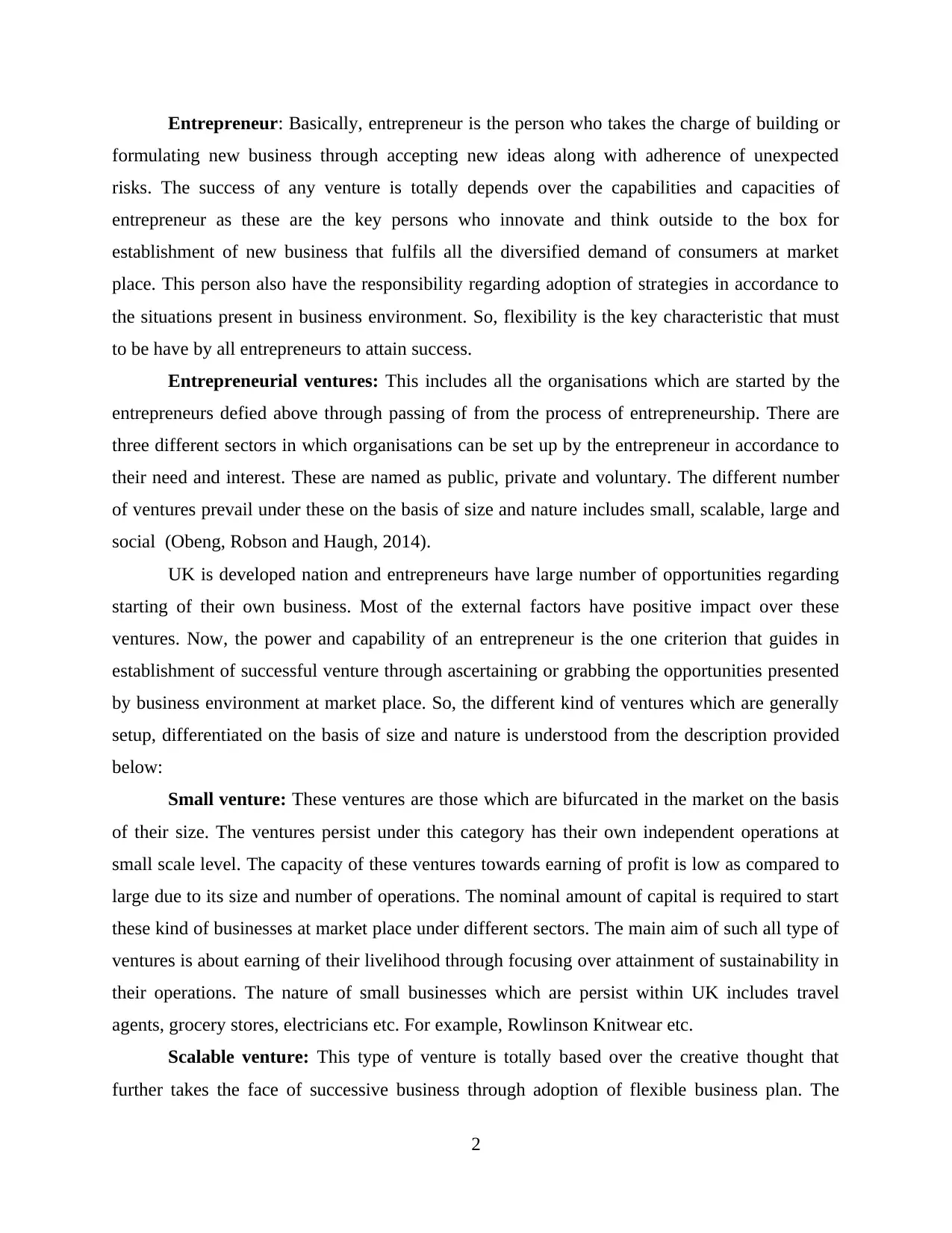
Entrepreneur: Basically, entrepreneur is the person who takes the charge of building or
formulating new business through accepting new ideas along with adherence of unexpected
risks. The success of any venture is totally depends over the capabilities and capacities of
entrepreneur as these are the key persons who innovate and think outside to the box for
establishment of new business that fulfils all the diversified demand of consumers at market
place. This person also have the responsibility regarding adoption of strategies in accordance to
the situations present in business environment. So, flexibility is the key characteristic that must
to be have by all entrepreneurs to attain success.
Entrepreneurial ventures: This includes all the organisations which are started by the
entrepreneurs defied above through passing of from the process of entrepreneurship. There are
three different sectors in which organisations can be set up by the entrepreneur in accordance to
their need and interest. These are named as public, private and voluntary. The different number
of ventures prevail under these on the basis of size and nature includes small, scalable, large and
social (Obeng, Robson and Haugh, 2014).
UK is developed nation and entrepreneurs have large number of opportunities regarding
starting of their own business. Most of the external factors have positive impact over these
ventures. Now, the power and capability of an entrepreneur is the one criterion that guides in
establishment of successful venture through ascertaining or grabbing the opportunities presented
by business environment at market place. So, the different kind of ventures which are generally
setup, differentiated on the basis of size and nature is understood from the description provided
below:
Small venture: These ventures are those which are bifurcated in the market on the basis
of their size. The ventures persist under this category has their own independent operations at
small scale level. The capacity of these ventures towards earning of profit is low as compared to
large due to its size and number of operations. The nominal amount of capital is required to start
these kind of businesses at market place under different sectors. The main aim of such all type of
ventures is about earning of their livelihood through focusing over attainment of sustainability in
their operations. The nature of small businesses which are persist within UK includes travel
agents, grocery stores, electricians etc. For example, Rowlinson Knitwear etc.
Scalable venture: This type of venture is totally based over the creative thought that
further takes the face of successive business through adoption of flexible business plan. The
2
formulating new business through accepting new ideas along with adherence of unexpected
risks. The success of any venture is totally depends over the capabilities and capacities of
entrepreneur as these are the key persons who innovate and think outside to the box for
establishment of new business that fulfils all the diversified demand of consumers at market
place. This person also have the responsibility regarding adoption of strategies in accordance to
the situations present in business environment. So, flexibility is the key characteristic that must
to be have by all entrepreneurs to attain success.
Entrepreneurial ventures: This includes all the organisations which are started by the
entrepreneurs defied above through passing of from the process of entrepreneurship. There are
three different sectors in which organisations can be set up by the entrepreneur in accordance to
their need and interest. These are named as public, private and voluntary. The different number
of ventures prevail under these on the basis of size and nature includes small, scalable, large and
social (Obeng, Robson and Haugh, 2014).
UK is developed nation and entrepreneurs have large number of opportunities regarding
starting of their own business. Most of the external factors have positive impact over these
ventures. Now, the power and capability of an entrepreneur is the one criterion that guides in
establishment of successful venture through ascertaining or grabbing the opportunities presented
by business environment at market place. So, the different kind of ventures which are generally
setup, differentiated on the basis of size and nature is understood from the description provided
below:
Small venture: These ventures are those which are bifurcated in the market on the basis
of their size. The ventures persist under this category has their own independent operations at
small scale level. The capacity of these ventures towards earning of profit is low as compared to
large due to its size and number of operations. The nominal amount of capital is required to start
these kind of businesses at market place under different sectors. The main aim of such all type of
ventures is about earning of their livelihood through focusing over attainment of sustainability in
their operations. The nature of small businesses which are persist within UK includes travel
agents, grocery stores, electricians etc. For example, Rowlinson Knitwear etc.
Scalable venture: This type of venture is totally based over the creative thought that
further takes the face of successive business through adoption of flexible business plan. The
2
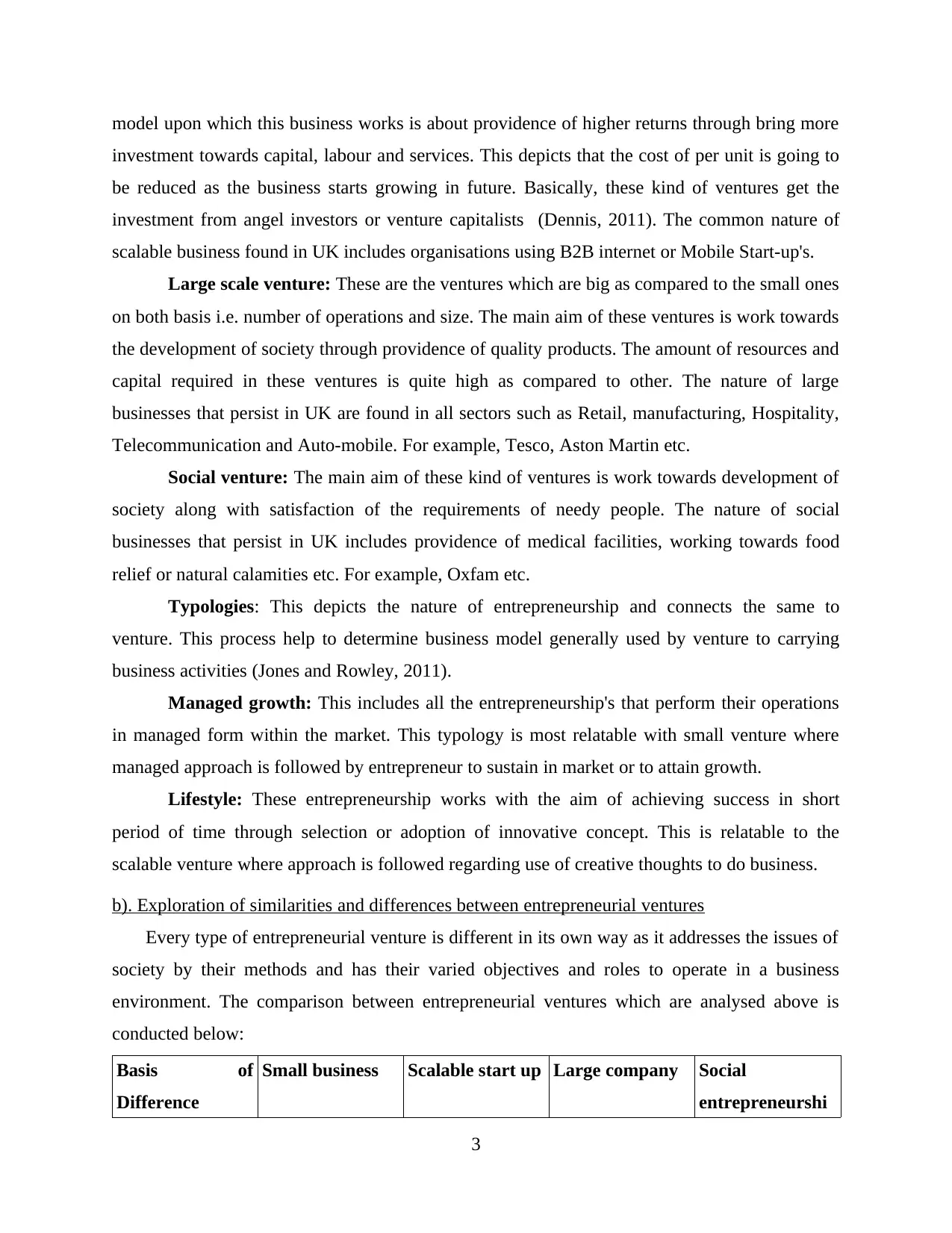
model upon which this business works is about providence of higher returns through bring more
investment towards capital, labour and services. This depicts that the cost of per unit is going to
be reduced as the business starts growing in future. Basically, these kind of ventures get the
investment from angel investors or venture capitalists (Dennis, 2011). The common nature of
scalable business found in UK includes organisations using B2B internet or Mobile Start-up's.
Large scale venture: These are the ventures which are big as compared to the small ones
on both basis i.e. number of operations and size. The main aim of these ventures is work towards
the development of society through providence of quality products. The amount of resources and
capital required in these ventures is quite high as compared to other. The nature of large
businesses that persist in UK are found in all sectors such as Retail, manufacturing, Hospitality,
Telecommunication and Auto-mobile. For example, Tesco, Aston Martin etc.
Social venture: The main aim of these kind of ventures is work towards development of
society along with satisfaction of the requirements of needy people. The nature of social
businesses that persist in UK includes providence of medical facilities, working towards food
relief or natural calamities etc. For example, Oxfam etc.
Typologies: This depicts the nature of entrepreneurship and connects the same to
venture. This process help to determine business model generally used by venture to carrying
business activities (Jones and Rowley, 2011).
Managed growth: This includes all the entrepreneurship's that perform their operations
in managed form within the market. This typology is most relatable with small venture where
managed approach is followed by entrepreneur to sustain in market or to attain growth.
Lifestyle: These entrepreneurship works with the aim of achieving success in short
period of time through selection or adoption of innovative concept. This is relatable to the
scalable venture where approach is followed regarding use of creative thoughts to do business.
b). Exploration of similarities and differences between entrepreneurial ventures
Every type of entrepreneurial venture is different in its own way as it addresses the issues of
society by their methods and has their varied objectives and roles to operate in a business
environment. The comparison between entrepreneurial ventures which are analysed above is
conducted below:
Basis of
Difference
Small business Scalable start up Large company Social
entrepreneurshi
3
investment towards capital, labour and services. This depicts that the cost of per unit is going to
be reduced as the business starts growing in future. Basically, these kind of ventures get the
investment from angel investors or venture capitalists (Dennis, 2011). The common nature of
scalable business found in UK includes organisations using B2B internet or Mobile Start-up's.
Large scale venture: These are the ventures which are big as compared to the small ones
on both basis i.e. number of operations and size. The main aim of these ventures is work towards
the development of society through providence of quality products. The amount of resources and
capital required in these ventures is quite high as compared to other. The nature of large
businesses that persist in UK are found in all sectors such as Retail, manufacturing, Hospitality,
Telecommunication and Auto-mobile. For example, Tesco, Aston Martin etc.
Social venture: The main aim of these kind of ventures is work towards development of
society along with satisfaction of the requirements of needy people. The nature of social
businesses that persist in UK includes providence of medical facilities, working towards food
relief or natural calamities etc. For example, Oxfam etc.
Typologies: This depicts the nature of entrepreneurship and connects the same to
venture. This process help to determine business model generally used by venture to carrying
business activities (Jones and Rowley, 2011).
Managed growth: This includes all the entrepreneurship's that perform their operations
in managed form within the market. This typology is most relatable with small venture where
managed approach is followed by entrepreneur to sustain in market or to attain growth.
Lifestyle: These entrepreneurship works with the aim of achieving success in short
period of time through selection or adoption of innovative concept. This is relatable to the
scalable venture where approach is followed regarding use of creative thoughts to do business.
b). Exploration of similarities and differences between entrepreneurial ventures
Every type of entrepreneurial venture is different in its own way as it addresses the issues of
society by their methods and has their varied objectives and roles to operate in a business
environment. The comparison between entrepreneurial ventures which are analysed above is
conducted below:
Basis of
Difference
Small business Scalable start up Large company Social
entrepreneurshi
3
⊘ This is a preview!⊘
Do you want full access?
Subscribe today to unlock all pages.

Trusted by 1+ million students worldwide
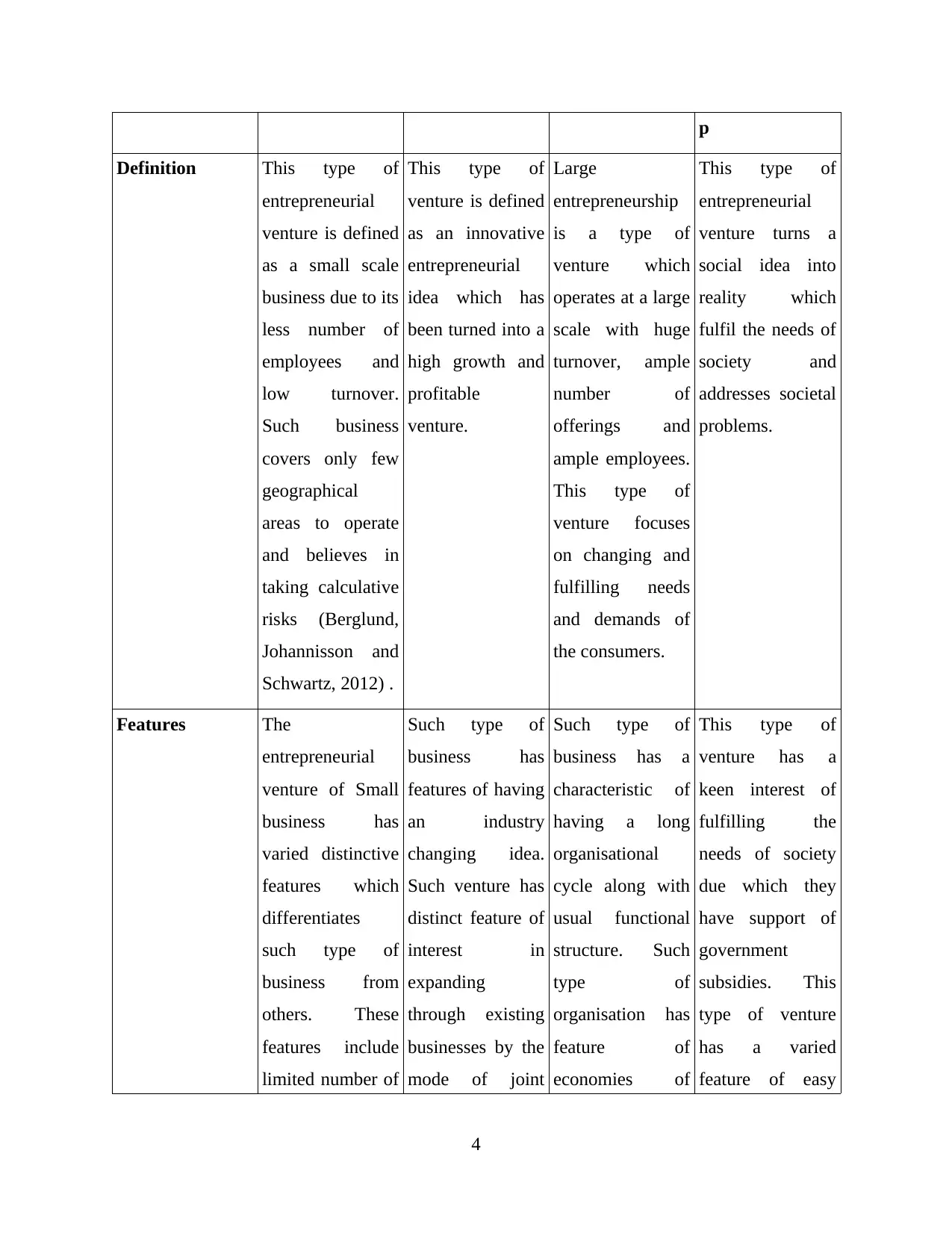
p
Definition This type of
entrepreneurial
venture is defined
as a small scale
business due to its
less number of
employees and
low turnover.
Such business
covers only few
geographical
areas to operate
and believes in
taking calculative
risks (Berglund,
Johannisson and
Schwartz, 2012) .
This type of
venture is defined
as an innovative
entrepreneurial
idea which has
been turned into a
high growth and
profitable
venture.
Large
entrepreneurship
is a type of
venture which
operates at a large
scale with huge
turnover, ample
number of
offerings and
ample employees.
This type of
venture focuses
on changing and
fulfilling needs
and demands of
the consumers.
This type of
entrepreneurial
venture turns a
social idea into
reality which
fulfil the needs of
society and
addresses societal
problems.
Features The
entrepreneurial
venture of Small
business has
varied distinctive
features which
differentiates
such type of
business from
others. These
features include
limited number of
Such type of
business has
features of having
an industry
changing idea.
Such venture has
distinct feature of
interest in
expanding
through existing
businesses by the
mode of joint
Such type of
business has a
characteristic of
having a long
organisational
cycle along with
usual functional
structure. Such
type of
organisation has
feature of
economies of
This type of
venture has a
keen interest of
fulfilling the
needs of society
due which they
have support of
government
subsidies. This
type of venture
has a varied
feature of easy
4
Definition This type of
entrepreneurial
venture is defined
as a small scale
business due to its
less number of
employees and
low turnover.
Such business
covers only few
geographical
areas to operate
and believes in
taking calculative
risks (Berglund,
Johannisson and
Schwartz, 2012) .
This type of
venture is defined
as an innovative
entrepreneurial
idea which has
been turned into a
high growth and
profitable
venture.
Large
entrepreneurship
is a type of
venture which
operates at a large
scale with huge
turnover, ample
number of
offerings and
ample employees.
This type of
venture focuses
on changing and
fulfilling needs
and demands of
the consumers.
This type of
entrepreneurial
venture turns a
social idea into
reality which
fulfil the needs of
society and
addresses societal
problems.
Features The
entrepreneurial
venture of Small
business has
varied distinctive
features which
differentiates
such type of
business from
others. These
features include
limited number of
Such type of
business has
features of having
an industry
changing idea.
Such venture has
distinct feature of
interest in
expanding
through existing
businesses by the
mode of joint
Such type of
business has a
characteristic of
having a long
organisational
cycle along with
usual functional
structure. Such
type of
organisation has
feature of
economies of
This type of
venture has a
keen interest of
fulfilling the
needs of society
due which they
have support of
government
subsidies. This
type of venture
has a varied
feature of easy
4
Paraphrase This Document
Need a fresh take? Get an instant paraphrase of this document with our AI Paraphraser
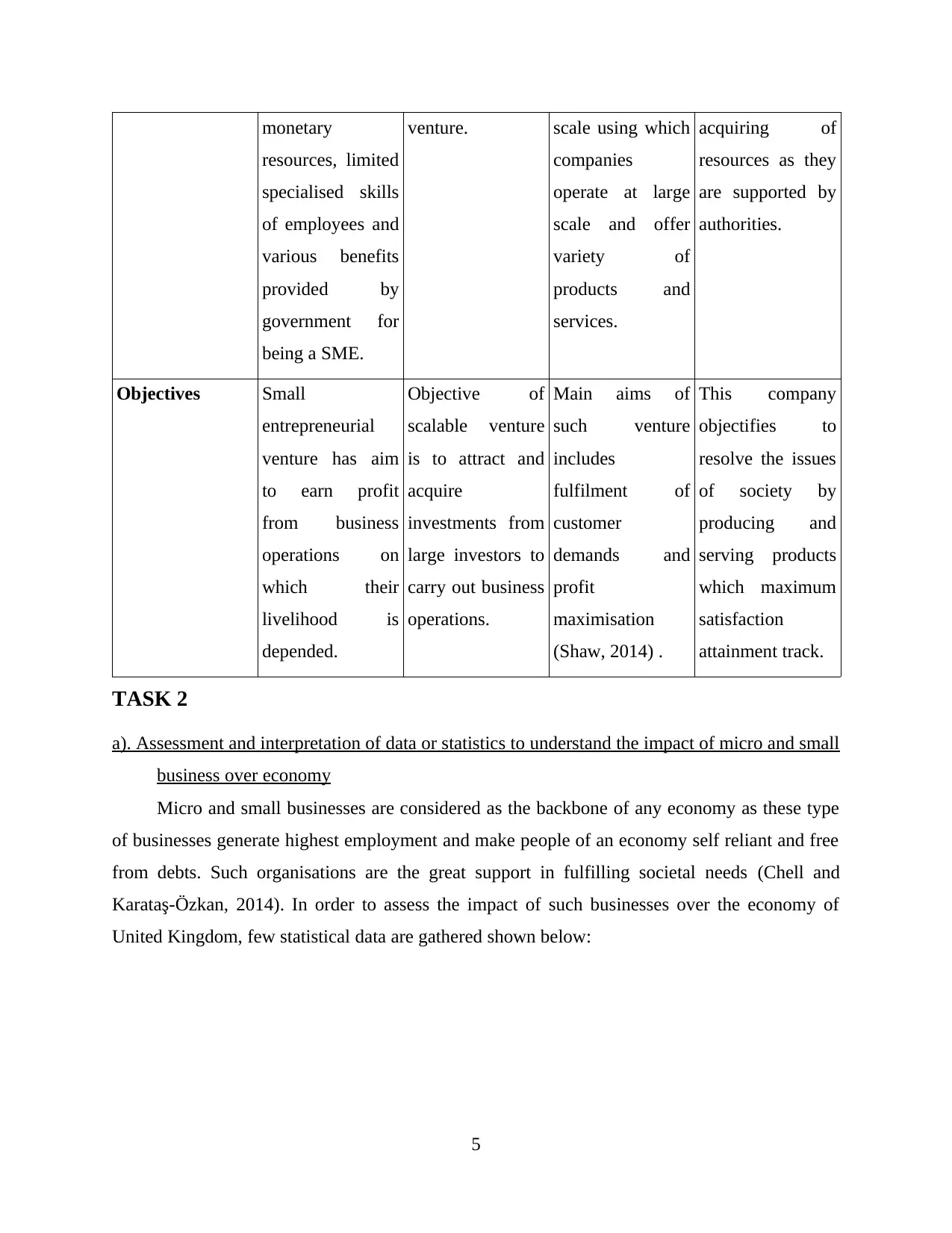
monetary
resources, limited
specialised skills
of employees and
various benefits
provided by
government for
being a SME.
venture. scale using which
companies
operate at large
scale and offer
variety of
products and
services.
acquiring of
resources as they
are supported by
authorities.
Objectives Small
entrepreneurial
venture has aim
to earn profit
from business
operations on
which their
livelihood is
depended.
Objective of
scalable venture
is to attract and
acquire
investments from
large investors to
carry out business
operations.
Main aims of
such venture
includes
fulfilment of
customer
demands and
profit
maximisation
(Shaw, 2014) .
This company
objectifies to
resolve the issues
of society by
producing and
serving products
which maximum
satisfaction
attainment track.
TASK 2
a). Assessment and interpretation of data or statistics to understand the impact of micro and small
business over economy
Micro and small businesses are considered as the backbone of any economy as these type
of businesses generate highest employment and make people of an economy self reliant and free
from debts. Such organisations are the great support in fulfilling societal needs (Chell and
Karataş-Özkan, 2014). In order to assess the impact of such businesses over the economy of
United Kingdom, few statistical data are gathered shown below:
5
resources, limited
specialised skills
of employees and
various benefits
provided by
government for
being a SME.
venture. scale using which
companies
operate at large
scale and offer
variety of
products and
services.
acquiring of
resources as they
are supported by
authorities.
Objectives Small
entrepreneurial
venture has aim
to earn profit
from business
operations on
which their
livelihood is
depended.
Objective of
scalable venture
is to attract and
acquire
investments from
large investors to
carry out business
operations.
Main aims of
such venture
includes
fulfilment of
customer
demands and
profit
maximisation
(Shaw, 2014) .
This company
objectifies to
resolve the issues
of society by
producing and
serving products
which maximum
satisfaction
attainment track.
TASK 2
a). Assessment and interpretation of data or statistics to understand the impact of micro and small
business over economy
Micro and small businesses are considered as the backbone of any economy as these type
of businesses generate highest employment and make people of an economy self reliant and free
from debts. Such organisations are the great support in fulfilling societal needs (Chell and
Karataş-Özkan, 2014). In order to assess the impact of such businesses over the economy of
United Kingdom, few statistical data are gathered shown below:
5
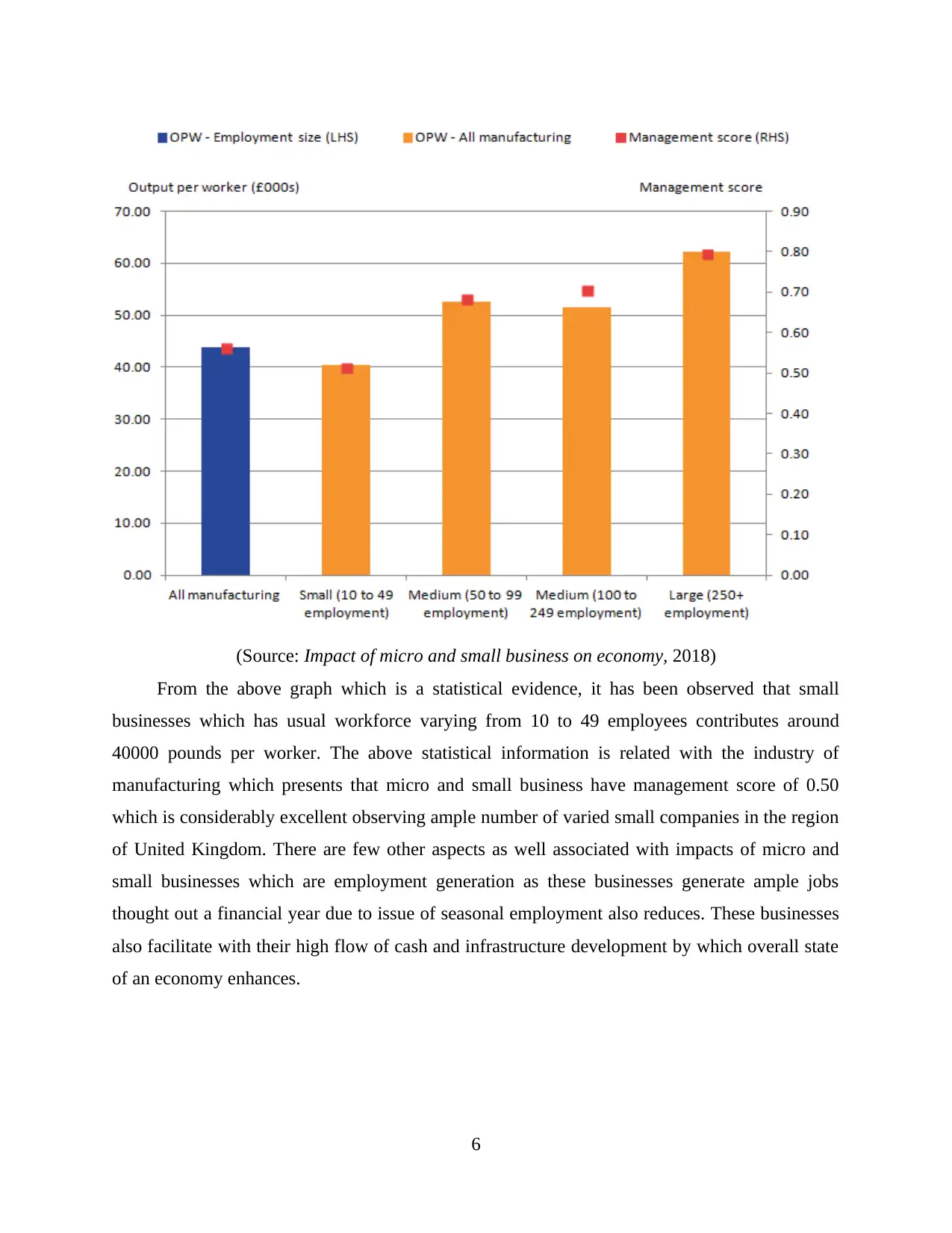
(Source: Impact of micro and small business on economy, 2018)
From the above graph which is a statistical evidence, it has been observed that small
businesses which has usual workforce varying from 10 to 49 employees contributes around
40000 pounds per worker. The above statistical information is related with the industry of
manufacturing which presents that micro and small business have management score of 0.50
which is considerably excellent observing ample number of varied small companies in the region
of United Kingdom. There are few other aspects as well associated with impacts of micro and
small businesses which are employment generation as these businesses generate ample jobs
thought out a financial year due to issue of seasonal employment also reduces. These businesses
also facilitate with their high flow of cash and infrastructure development by which overall state
of an economy enhances.
6
From the above graph which is a statistical evidence, it has been observed that small
businesses which has usual workforce varying from 10 to 49 employees contributes around
40000 pounds per worker. The above statistical information is related with the industry of
manufacturing which presents that micro and small business have management score of 0.50
which is considerably excellent observing ample number of varied small companies in the region
of United Kingdom. There are few other aspects as well associated with impacts of micro and
small businesses which are employment generation as these businesses generate ample jobs
thought out a financial year due to issue of seasonal employment also reduces. These businesses
also facilitate with their high flow of cash and infrastructure development by which overall state
of an economy enhances.
6
⊘ This is a preview!⊘
Do you want full access?
Subscribe today to unlock all pages.

Trusted by 1+ million students worldwide
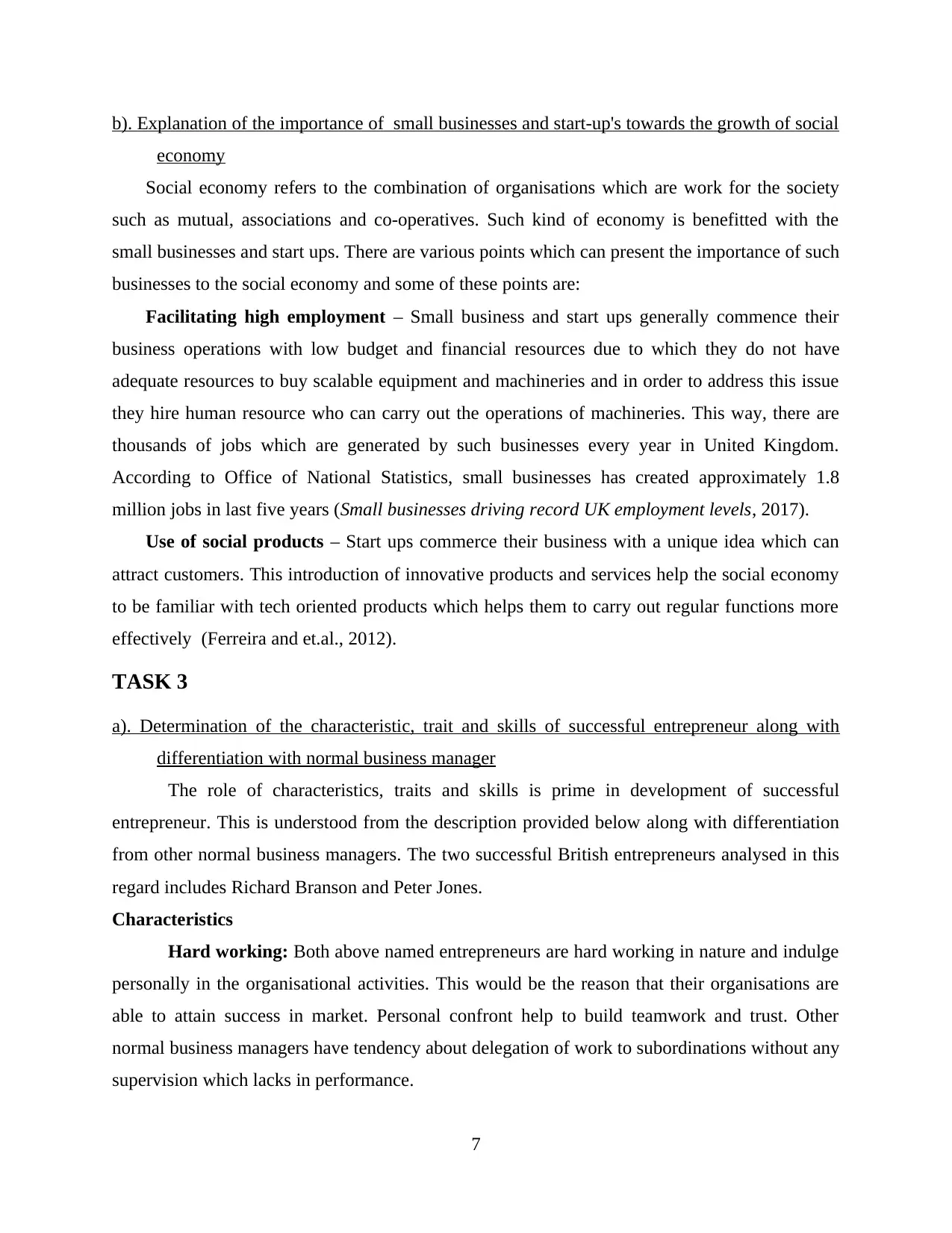
b). Explanation of the importance of small businesses and start-up's towards the growth of social
economy
Social economy refers to the combination of organisations which are work for the society
such as mutual, associations and co-operatives. Such kind of economy is benefitted with the
small businesses and start ups. There are various points which can present the importance of such
businesses to the social economy and some of these points are:
Facilitating high employment – Small business and start ups generally commence their
business operations with low budget and financial resources due to which they do not have
adequate resources to buy scalable equipment and machineries and in order to address this issue
they hire human resource who can carry out the operations of machineries. This way, there are
thousands of jobs which are generated by such businesses every year in United Kingdom.
According to Office of National Statistics, small businesses has created approximately 1.8
million jobs in last five years (Small businesses driving record UK employment levels, 2017).
Use of social products – Start ups commerce their business with a unique idea which can
attract customers. This introduction of innovative products and services help the social economy
to be familiar with tech oriented products which helps them to carry out regular functions more
effectively (Ferreira and et.al., 2012).
TASK 3
a). Determination of the characteristic, trait and skills of successful entrepreneur along with
differentiation with normal business manager
The role of characteristics, traits and skills is prime in development of successful
entrepreneur. This is understood from the description provided below along with differentiation
from other normal business managers. The two successful British entrepreneurs analysed in this
regard includes Richard Branson and Peter Jones.
Characteristics
Hard working: Both above named entrepreneurs are hard working in nature and indulge
personally in the organisational activities. This would be the reason that their organisations are
able to attain success in market. Personal confront help to build teamwork and trust. Other
normal business managers have tendency about delegation of work to subordinations without any
supervision which lacks in performance.
7
economy
Social economy refers to the combination of organisations which are work for the society
such as mutual, associations and co-operatives. Such kind of economy is benefitted with the
small businesses and start ups. There are various points which can present the importance of such
businesses to the social economy and some of these points are:
Facilitating high employment – Small business and start ups generally commence their
business operations with low budget and financial resources due to which they do not have
adequate resources to buy scalable equipment and machineries and in order to address this issue
they hire human resource who can carry out the operations of machineries. This way, there are
thousands of jobs which are generated by such businesses every year in United Kingdom.
According to Office of National Statistics, small businesses has created approximately 1.8
million jobs in last five years (Small businesses driving record UK employment levels, 2017).
Use of social products – Start ups commerce their business with a unique idea which can
attract customers. This introduction of innovative products and services help the social economy
to be familiar with tech oriented products which helps them to carry out regular functions more
effectively (Ferreira and et.al., 2012).
TASK 3
a). Determination of the characteristic, trait and skills of successful entrepreneur along with
differentiation with normal business manager
The role of characteristics, traits and skills is prime in development of successful
entrepreneur. This is understood from the description provided below along with differentiation
from other normal business managers. The two successful British entrepreneurs analysed in this
regard includes Richard Branson and Peter Jones.
Characteristics
Hard working: Both above named entrepreneurs are hard working in nature and indulge
personally in the organisational activities. This would be the reason that their organisations are
able to attain success in market. Personal confront help to build teamwork and trust. Other
normal business managers have tendency about delegation of work to subordinations without any
supervision which lacks in performance.
7
Paraphrase This Document
Need a fresh take? Get an instant paraphrase of this document with our AI Paraphraser
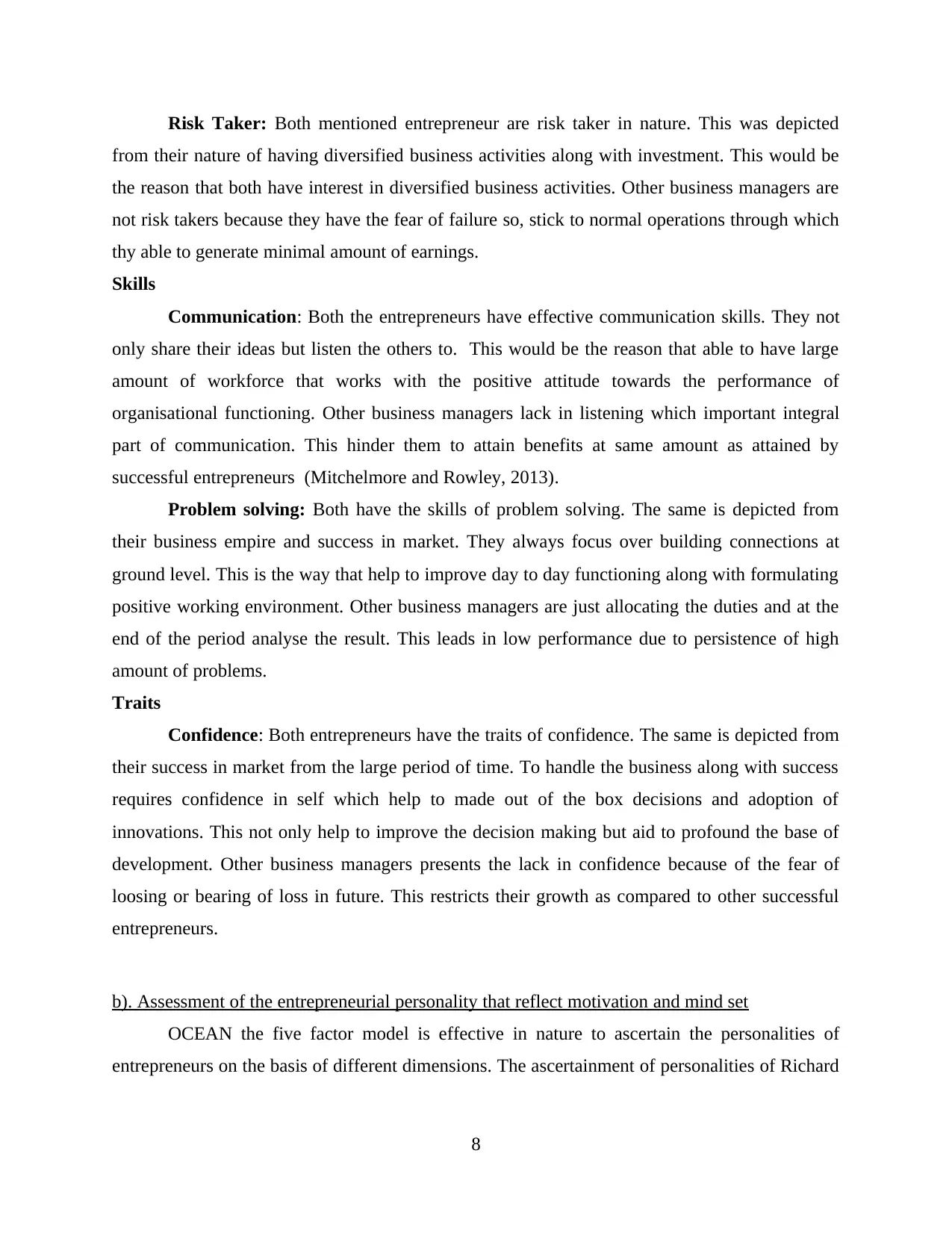
Risk Taker: Both mentioned entrepreneur are risk taker in nature. This was depicted
from their nature of having diversified business activities along with investment. This would be
the reason that both have interest in diversified business activities. Other business managers are
not risk takers because they have the fear of failure so, stick to normal operations through which
thy able to generate minimal amount of earnings.
Skills
Communication: Both the entrepreneurs have effective communication skills. They not
only share their ideas but listen the others to. This would be the reason that able to have large
amount of workforce that works with the positive attitude towards the performance of
organisational functioning. Other business managers lack in listening which important integral
part of communication. This hinder them to attain benefits at same amount as attained by
successful entrepreneurs (Mitchelmore and Rowley, 2013).
Problem solving: Both have the skills of problem solving. The same is depicted from
their business empire and success in market. They always focus over building connections at
ground level. This is the way that help to improve day to day functioning along with formulating
positive working environment. Other business managers are just allocating the duties and at the
end of the period analyse the result. This leads in low performance due to persistence of high
amount of problems.
Traits
Confidence: Both entrepreneurs have the traits of confidence. The same is depicted from
their success in market from the large period of time. To handle the business along with success
requires confidence in self which help to made out of the box decisions and adoption of
innovations. This not only help to improve the decision making but aid to profound the base of
development. Other business managers presents the lack in confidence because of the fear of
loosing or bearing of loss in future. This restricts their growth as compared to other successful
entrepreneurs.
b). Assessment of the entrepreneurial personality that reflect motivation and mind set
OCEAN the five factor model is effective in nature to ascertain the personalities of
entrepreneurs on the basis of different dimensions. The ascertainment of personalities of Richard
8
from their nature of having diversified business activities along with investment. This would be
the reason that both have interest in diversified business activities. Other business managers are
not risk takers because they have the fear of failure so, stick to normal operations through which
thy able to generate minimal amount of earnings.
Skills
Communication: Both the entrepreneurs have effective communication skills. They not
only share their ideas but listen the others to. This would be the reason that able to have large
amount of workforce that works with the positive attitude towards the performance of
organisational functioning. Other business managers lack in listening which important integral
part of communication. This hinder them to attain benefits at same amount as attained by
successful entrepreneurs (Mitchelmore and Rowley, 2013).
Problem solving: Both have the skills of problem solving. The same is depicted from
their business empire and success in market. They always focus over building connections at
ground level. This is the way that help to improve day to day functioning along with formulating
positive working environment. Other business managers are just allocating the duties and at the
end of the period analyse the result. This leads in low performance due to persistence of high
amount of problems.
Traits
Confidence: Both entrepreneurs have the traits of confidence. The same is depicted from
their success in market from the large period of time. To handle the business along with success
requires confidence in self which help to made out of the box decisions and adoption of
innovations. This not only help to improve the decision making but aid to profound the base of
development. Other business managers presents the lack in confidence because of the fear of
loosing or bearing of loss in future. This restricts their growth as compared to other successful
entrepreneurs.
b). Assessment of the entrepreneurial personality that reflect motivation and mind set
OCEAN the five factor model is effective in nature to ascertain the personalities of
entrepreneurs on the basis of different dimensions. The ascertainment of personalities of Richard
8
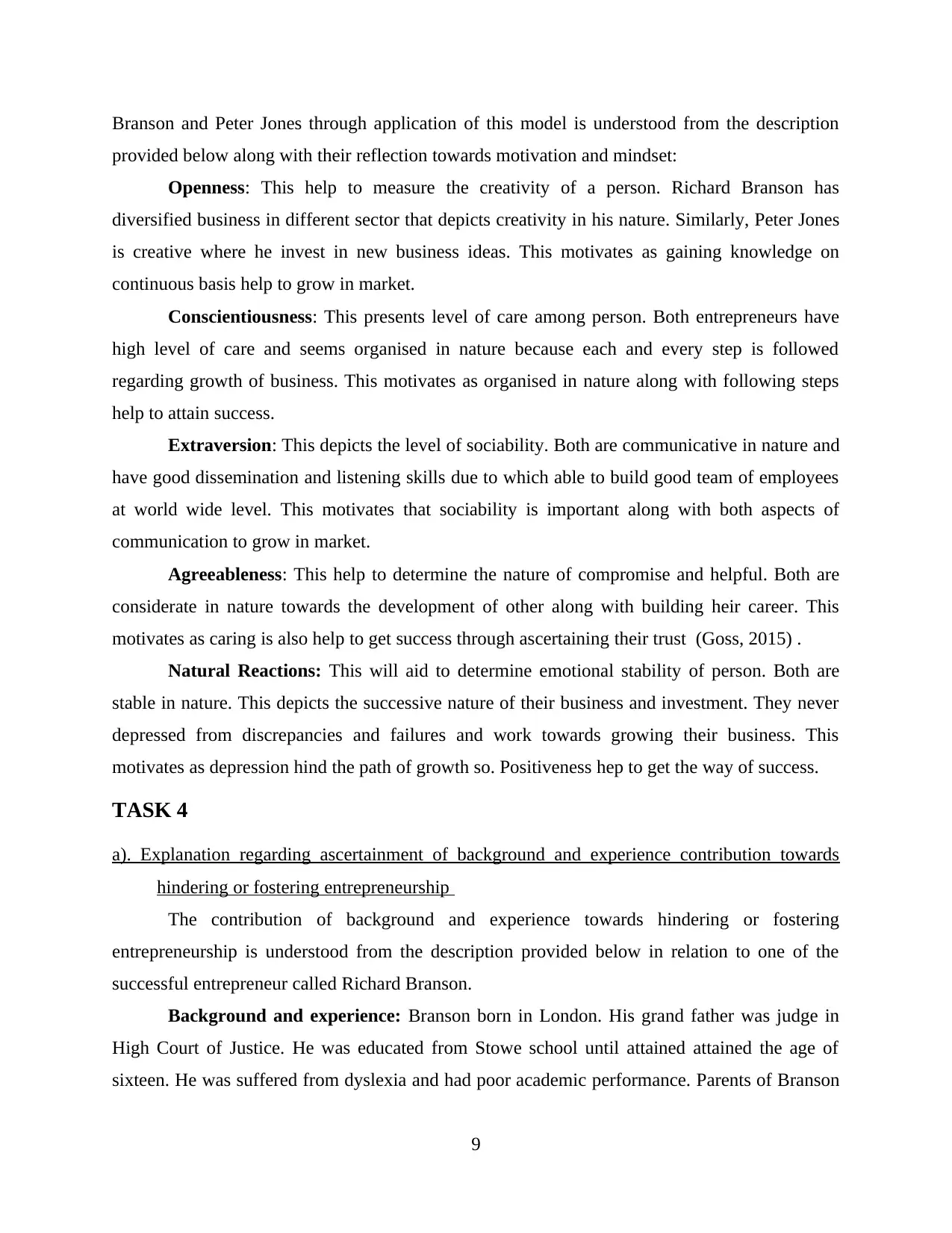
Branson and Peter Jones through application of this model is understood from the description
provided below along with their reflection towards motivation and mindset:
Openness: This help to measure the creativity of a person. Richard Branson has
diversified business in different sector that depicts creativity in his nature. Similarly, Peter Jones
is creative where he invest in new business ideas. This motivates as gaining knowledge on
continuous basis help to grow in market.
Conscientiousness: This presents level of care among person. Both entrepreneurs have
high level of care and seems organised in nature because each and every step is followed
regarding growth of business. This motivates as organised in nature along with following steps
help to attain success.
Extraversion: This depicts the level of sociability. Both are communicative in nature and
have good dissemination and listening skills due to which able to build good team of employees
at world wide level. This motivates that sociability is important along with both aspects of
communication to grow in market.
Agreeableness: This help to determine the nature of compromise and helpful. Both are
considerate in nature towards the development of other along with building heir career. This
motivates as caring is also help to get success through ascertaining their trust (Goss, 2015) .
Natural Reactions: This will aid to determine emotional stability of person. Both are
stable in nature. This depicts the successive nature of their business and investment. They never
depressed from discrepancies and failures and work towards growing their business. This
motivates as depression hind the path of growth so. Positiveness hep to get the way of success.
TASK 4
a). Explanation regarding ascertainment of background and experience contribution towards
hindering or fostering entrepreneurship
The contribution of background and experience towards hindering or fostering
entrepreneurship is understood from the description provided below in relation to one of the
successful entrepreneur called Richard Branson.
Background and experience: Branson born in London. His grand father was judge in
High Court of Justice. He was educated from Stowe school until attained attained the age of
sixteen. He was suffered from dyslexia and had poor academic performance. Parents of Branson
9
provided below along with their reflection towards motivation and mindset:
Openness: This help to measure the creativity of a person. Richard Branson has
diversified business in different sector that depicts creativity in his nature. Similarly, Peter Jones
is creative where he invest in new business ideas. This motivates as gaining knowledge on
continuous basis help to grow in market.
Conscientiousness: This presents level of care among person. Both entrepreneurs have
high level of care and seems organised in nature because each and every step is followed
regarding growth of business. This motivates as organised in nature along with following steps
help to attain success.
Extraversion: This depicts the level of sociability. Both are communicative in nature and
have good dissemination and listening skills due to which able to build good team of employees
at world wide level. This motivates that sociability is important along with both aspects of
communication to grow in market.
Agreeableness: This help to determine the nature of compromise and helpful. Both are
considerate in nature towards the development of other along with building heir career. This
motivates as caring is also help to get success through ascertaining their trust (Goss, 2015) .
Natural Reactions: This will aid to determine emotional stability of person. Both are
stable in nature. This depicts the successive nature of their business and investment. They never
depressed from discrepancies and failures and work towards growing their business. This
motivates as depression hind the path of growth so. Positiveness hep to get the way of success.
TASK 4
a). Explanation regarding ascertainment of background and experience contribution towards
hindering or fostering entrepreneurship
The contribution of background and experience towards hindering or fostering
entrepreneurship is understood from the description provided below in relation to one of the
successful entrepreneur called Richard Branson.
Background and experience: Branson born in London. His grand father was judge in
High Court of Justice. He was educated from Stowe school until attained attained the age of
sixteen. He was suffered from dyslexia and had poor academic performance. Parents of Branson
9
⊘ This is a preview!⊘
Do you want full access?
Subscribe today to unlock all pages.

Trusted by 1+ million students worldwide
1 out of 15
Related Documents
Your All-in-One AI-Powered Toolkit for Academic Success.
+13062052269
info@desklib.com
Available 24*7 on WhatsApp / Email
![[object Object]](/_next/static/media/star-bottom.7253800d.svg)
Unlock your academic potential
Copyright © 2020–2026 A2Z Services. All Rights Reserved. Developed and managed by ZUCOL.




